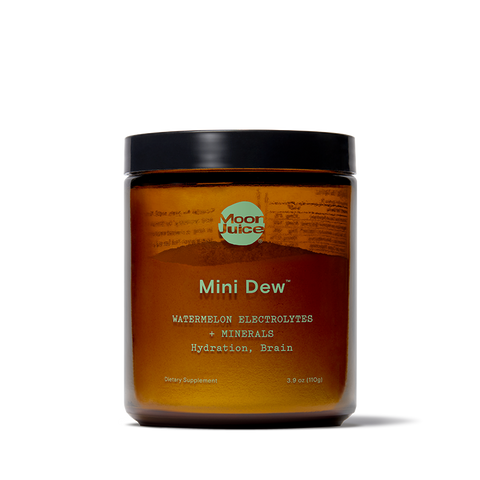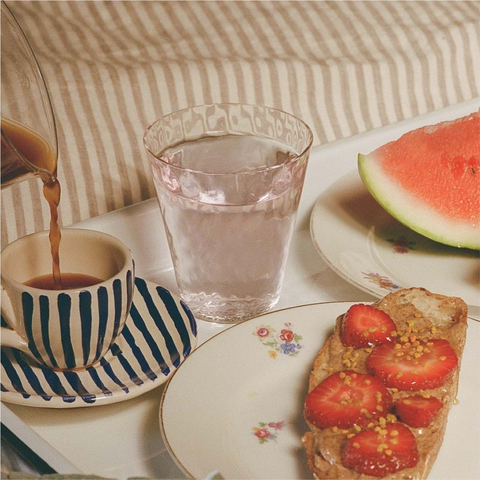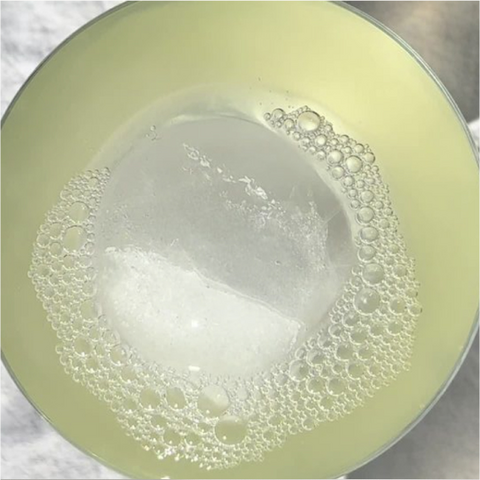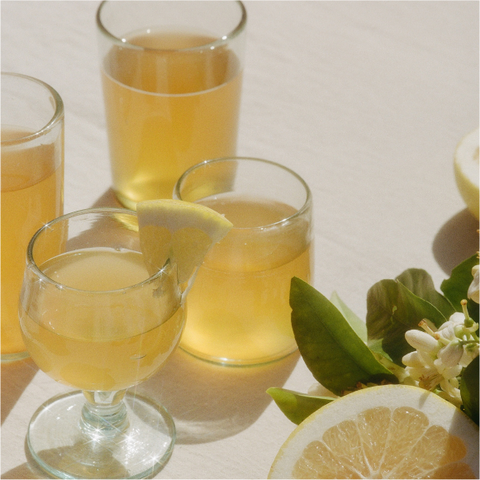Staying hydrated should be a priority 365 days a year — full stop. Yet it’s particularly crucial once temps rise, namely when you’re out and about in the summer sun. After all, water comprises up to 60 percent of the human body, which needs replenishing as you lose fluids through sweat and urine.
Whether you aren’t crazy about the taste of plain H2O or simply forget to get enough fluids, not everyone is great at keeping their hydration game in check. Still, it’s well worth doing so to avoid the pangs of dehydration and electrolyte imbalance.
Ahead, we’re covering how to stay hydrated all summer (and year) long with 8 tried and true tips.
1. Drink Water Regularly Throughout the Day
Consistency is one of the keys to staying hydrated. Not only should you drink enough water daily, but also space your sips throughout the day. You might be wondering how to rehydrate fast and think chugging a bottle of water is the way to do so. However, drinking water regularly is better than chugging a bunch at a time (say, only once serious thirst sets in after a sweat sesh or after a long day at the beach) since it’ll help:
- Maintain more steady hydration levels
- Take the strain off your kidneys and bladder
- Avoid bloating or stomach upset
- Reduce middle-of-the-night trips to the toilet
One of the key questions about staying hydrated is how much water you really need daily. The answer varies by the source and is based on a number of individualized factors (including but not limited to your age, gender, health status, medications, level of physical activity, and climate considerations). According to the U.S. National Academies of Sciences, Engineering, and Medicine, daily adequate fluid intake is:
- 15.5 cups (3.7 liters) for men
- 11.5 cups (2.7 liters) for women
Often cited standards also include 8 cups (64 ounces) of water daily, or drinking half of your body weight in pounds converted to ounces. (For instance, a 150-pound person would aim for 75 ounces of water daily.)
All things considered, these quotas are nice goalposts to keep in mind for healthy hydration levels. You’ll ultimately get the best sense of how much water you need day in and day out, as well as when you need to rev up your intake based on symptoms (or, better yet, an absence thereof). If you know you don’t drink enough water, sipping on 8 cups daily — ideally throughout the day — could be a decent minimum to aim for in your revamped hydration routine.
2. Incorporate Hydrating Fruits & Veggies Into Your Diet
For those who aren’t so enthusiastic about drinking H2O, rest assured that there are more fun and flavorful ways to stay hydrated. In fact, if you’re looking for ways to stay hydrated without drinking water, consider boosting hydration levels through the fruits and veggies you eat. According to UCLA Health, some of the most hydrating fruits and veggies include:
- Cucumbers (96 percent water)
- Celery (95 percent water)
- Radishes (95 percent water)
- Tomatoes (94 percent water)
- Bell peppers (92 percent water)
- Spinach (92 percent water)
- Strawberries (92 percent water)
- Watermelon (92 percent water)
Not only do these tasty produce items have a high water content, but some are among the best foods with electrolytes, too. For instance, juicy watermelon isn’t simply a delectable summer treat; its abundant electrolyte content can also help maintain fluid balance in cells and throughout the entire body, supporting hydration in the process. Per the USDA, a single cup (about 150 grams) of diced watermelon offers:
- 10.5 mg of Calcium
- 15.2 mg of Magnesium
- 170 mg of Potassium
- 16.7 mg of Phosphorus
As such, snacking on watermelon for hydration is a sure bet to delight your taste buds, replenish fluids, and restore electrolyte imbalance.
3. Always Carry a Water Bottle With You
Consistency and convenience will make your quest to stay hydrated all the more fruitful. If you’re the type to forget to sip on water regularly or find yourself parched more often than you’d like, investing in a reusable water bottle—and keeping it filled and at the ready—is among the top tips to stay hydrated.
This hydration hack is immensely helpful if you’re trying to improve your daily water intake while you’re commuting to work, sitting poolside, running errands, traveling, or working out. Out of sight can often mean out of mind, so keep your reusable water bottle on hand and visible to stay hydrated no matter where the day takes you.
4. Begin Each Day With a Glass of Water
ICYMI, sleeping is a dehydrating event. Your body may lose up to a liter of water each night via breathing and perspiration… even more so if you have night sweats and/or sleep with your mouth open. Drinking a glass of H2O upon waking is a foolproof way to counteract overnight water loss. It’s also ideal to drink water before coffee (or your alt caffeinated bev of choice).
Need help making this hydration tip a solid habit? Consider keeping a cup of H2O on your bedside table or leaving your fave glass in plain view on the kitchen counter to fill upon rising and shining.
Want to make drinking water fun? Consider making your own sexy water – a mixture of water, electrolytes, fruit, and ice. This drink is fun, tasty, and refreshing, making it a great addition to your hydration routine and the start of your days.
5. Use Reminders to Drink Water Regularly
If you’re the type to live by your day planner or digital calendar, setting reminders can help you stay accountable to hydrate properly. Setting push notifications to ping you throughout the day, keeping sticky notes on your monitor, and similar set-ups can help you stay consistent with your fluid intake. Some people may also choose to purchase large water bottles that come with markups indicating ideal times by which your water should be at a certain level.
6. Add Electrolytes to Your Water
The best way to stay hydrated includes adding electrolytes to your water. According to the Cleveland Clinic, the different types of electrolytes can assist:
- Regulating chemical reactions in the body
- Maintaining fluid balance in and outside of cells
- Your heartbeat and muscle contractions
While electrolytes don’t directly increase hydration levels, these electrically charged minerals indirectly help replenish hydration. Since electrolytes help to keep fluids in balance, maintaining healthy levels can help you avoid water loss and reduce the risk of dehydration.
7. Monitor Your Urine for Signs of Hydration
Your toilet talks to you. When it comes to your urine, it’s able to communicate how hydrated you are. Pale, mildly yellow, and odorless urine indicates that you’re well hydrated. On the flip side, small amounts of dark and pungent urine signals that you’re likely dehydrated and should ingest more fluids ASAP.
Note: As you embark on the best ways to stay hydrated, chances are you’ll be urinating more often than usual. While this is expected, urinating still counts as fluid loss, and there’s a chance you’ll flush out important electrolytes along with your urine. While it’s smart to sip up regularly and keep tabs on your urine color, it’s just as important to be aware of the signs of electrolyte imbalance (think: fatigue, headaches, irritability, and muscle cramps) and replenish your electrolytes regularly.
8. Limit Intake of Diuretics Like Coffee, Tea, & Alcohol
In order to hydrate properly, it’s not only important to know what to add (i.e., more water and electrolytes) but also to subtract. Diuretics like coffee, caffeinated tea, and alcohol can all make you urinate more often and thus can contribute to dehydration. If you’re not ready to quit them entirely, you can aim to reduce your intake and/or remember to drink water (as well as eat hydrating foods) before or after intake.
On that note, try not to reach for a sports drink when you’re thirsty. Plain water and electrolytes are a better combination, as they're free of added sugar and unhealthy ingredients. No electrolytes on hand? Adding salt to water for hydration can also work wonders in a pinch. Due to its high essential mineral content, there are many benefits of Himalayan salt, making it the best choice to have on hand at home.
Stay Hydrated With Mini Dew
Each of these tips for hydration can help you make progress on your wellness goals and beat the summer heat. To complement your new and improved hydration game, consider opting for an electrolyte powder mix like Mini Dew™. Available in Watermelon, Pomelo, and Naked (unflavored) offerings, this 100 percent traceable electrolyte drink powder helps to:
- Quench your brain and body*
- Maintain water balance in and around cells*
- Give the body the elements it needs to feel good and energized*
Simply add 1 tsp to 12 oz of plain water daily - or more frequently, up to 4x / day - to keep your hydration levels in check, get essential mineralization, and benefit from an electrolyte boost.
Shop Mini Dew™ today to make your own homemade electrolyte drink so you can stay hydrated!

Sources
- USGS. The Water in You: Water and the Human Body. https://www.usgs.gov/special-topics/water-science-school/science/water-you-water-and-human-body
- Mayo Clinic. Water: How much should you drink every day? https://www.mayoclinic.org/healthy-lifestyle/nutrition-and-healthy-eating/in-depth/water/art-20044256
- UCLA Health. 15 foods that help you stay hydrated. https://www.uclahealth.org/news/article/15-food-that-help-you-stay-hydrated
- USDA, Food Data Cenetral. Watermelon, raw. https://fdc.nal.usda.gov/fdc-app.html#/food-details/167765/nutrients
- Cleveland Clinic. Electrolytes. https://my.clevelandclinic.org/health/diagnostics/21790-electrolytes
- NSW Health. Urine colour chart. https://www.health.nsw.gov.au/environment/beattheheat/Pages/urine-colour-chart.aspx














